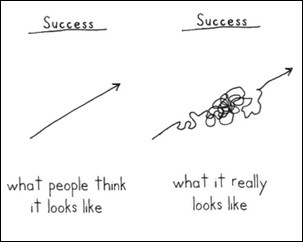The road from from undergraduate to graduate studies can be a bumpy one. In an effort to help you make a smoother transition to graduate studies at Concordia, on Jan. 19 we offered a workshop packed with important tips and info. If you’re looking to learn strategies to manage the major issues affecting grad students (including isolation, stress, and lack of motivation), identify resources that can help you in your studies, and develop positive relations within the graduate community, you can register for GPLL10 - Graduate School Success: How to Make the Most of Your Education.
Here are a couple of strategies that we explore in the workshop, led by Monica Boulos from the Student Success Centre.
Motivating yourself
- Start thinking about your interests and goals. Which topics inspire and encourage you? Once you’ve identified these, you can choose a program (and eventually research topic) that aligns with your interests and values. It’s also helpful to identify a longer-term career objective to strive for. How does graduate school allow you to work towards that?
- Create an action plan for achieving your goals, breaking down larger tasks into smaller chunks of work. Harvard Business Review offers a four-step tool which allows you to do exactly that, using a technique that’s called if-then planning. You can also register for one of our Time Management Techniques for Research Projects workshops.
- Give yourself reminders of your goals, including visual ones. Relevant Magazine’s first key for success in grad school is keeping a written set of goals. In doing so, “you’ll feel even more accomplished in your work when you’re able to cross the most important items off your list—a visual representation of how far you’ve come.” There are loads of applications that act as tasks managers for your computer and mobile device.
- It can also be helpful to communicate your goals to others to others, whether your supervisor or your study group. It’ll help make them more concrete - not to mention you’ll have others to help you be more accountable.
- Change the way you think. The importance of positive self-talk has been well-established. Put simply, how you think affects how you feel, and if you’re constantly telling yourself you are not smart or good enough to complete a task, those thoughts will contribute to a lack of motivation and higher levels of procrastination and stress. For example, whenever you catch yourself thinking something like “This concept is impossible. It’s too abstract and I’ll never grasp it,” re-frame that negative self-talk into more positive thoughts: “This is a challenging concept, but with a little effort and patience, and maybe a little help from my classmate or professor, I’ll be able to get to the bottom of this. And I’ll feel great when I’ll do!”
Standing out and getting ahead
- Being visible in your department, networks, and field is key to creating professional opportunities. But you don’t have to wait til you’ve secured your PhD to “grow your academic footprint,” as Next Scientist puts it. Instead, try to start talking about your work as early as you can -- even if it’s just asking questions. If you’re looking to be more visible online, try our Maximizing LinkedIn, Facebook and Twitter for Career Growth workshop.
- If you’re new to your field, create a blog (if you know you can update one reliably and well), or submit to your society publication or magazine. You can also start writing book reviews, assist your supervisor or co-review in your lab group.
- The same principle applies to presenting: begin with internal and graduate student conferences and work your way up.
- You can forge links within your discipline by asking to visit other research teams and labs.
- Get to know your department, faculty, and university! Attend events inside and outside of your department (such as guest speakers, seminars, and other students’ thesis defences). Concordia maintains an updated list of events happening on campus. Keep an eye out for the departmental emails and the GradProSkills newsletter for news about other events as they arise.
- Concordia’s Graduate Student Association is hosting its Winter Orientation. It’s a great way to meet your graduate student community and learn more about ways to get involved. You can also get involved by joining one of Concordia’s countless student groups, or a recreational sports league.
Other ways to make connections and expand your network
- You can connect with a professional mentor through Concordia’s Alumni Relations Student Program. Or, you can connect with a Student Success Mentor.
- Volunteer for an organization you care about! In addition to giving you the satisfaction of contributing to your community, volunteering can help you develop skills and improve your career prospects. Learn more about the strategic impact of volunteering at our Launch your Career, Volunteer! workshop.
- Bonus: In addition to increasing your visibility, these strategies can break feelings of isolation that often arise in graduate school.
For more strategies for graduate school success, check our page for upcoming workshops.
Image courtesy of Bernard Goldbach on Flickr.

